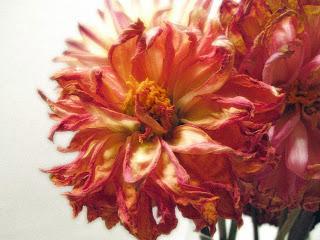
Dahlia by Melina Meza
It has only struck me recently that while we’ve written about what aging is and the many ways yoga can help foster healthy aging, we’ve never really addressed what “healthy aging” is. So I thought I’d take a moment to give an overview of the thoughts that Baxter and I currently have on this topic. At this point—we’re still just discussing these ideas—we consider healthy aging to have three important aspects:- Compressed Morbidity
- Independence
- Equanimity
Compressed Morbidity. Last week I wrote a post Longevity vs. Morbidity comparing the difference between longevity and morbidity. The medical term “morbidity” refers to the period of time you spend in ill health before you die. Obviously we all would like—both for ourselves and for our loved ones—to keep this period of ill health as short (that is, compressed) as possible. A well-rounded yoga practice, especially one that includes stress management, can help by preventing some of the diseases, such as heart disease, high blood pressure, and diabetes that plague people during their older years.
Independence. Another goal I think we all share for ourselves and our loved ones is that we can continue to live independently and care for ourselves as long as possible. From our point of view living independently includes both the basic daily self care activities, such as dressing, going to the toilet, getting up and down from a chair, doing light housework, and so on as well as the ability to continue to do the activities we love (which I wrote about in my post Being Able to Do What You Love) for as long as possible. A regular asana practice—even one that is modified over time—will help keep us able bodied, rather than sliding into the stiffness and weakness that results from a sedentary lifestyle.
Equanimity. For me, maintaining emotional stability as we age is the most important aspect of healthy aging. For even if we can “compress” morbidity, we will certainly have to go through poor health at some point. And even if we can prolong our independence into old age, we may eventually have to face the loss of that, however briefly. In addition, even if we are ourselves blessed with long and healthy lives, we’ll all have to deal with losing people we love. So being able to handle the challenges ahead with balance and grace is crucial. But I also believe that this is where yoga has its greatest strength. Stress management practices help reduce stress, anxiety and depression. And meditation and yoga philosophy can help us keep grounded and strong. At least that is my fervent hope.
Baxter and I will be writing more on these topics in the weeks to come, but we’d also love to hear your thoughts, ideas and personal stories.

